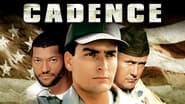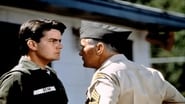DieKakutanienschpiel
Plot summary: a group of racist blacks beat and rob a white soldier and then, when he doesn't narc them out, accept him with great reluctance. This is what happens when Hollywood white guilt takes steroids.The acting is pretty good, but this is a classic example of black -on - white racism disguised as a morality tale about the evils of white - on - black racism. It's also the worst of the worst in the category of 'let's have us some black folk teach a white kid how to dance.' Shoot me now. Please, do it. I beg you. Laurence Fishburne musta been either really angry or really desperate, to tag this dog onto his otherwise impressive resume.
Rodrigo Amaro
Such a shame that good talents were thrown to the winds on a unnecessary effort of trying to make something good out of almost nothing. Story is heavily clichéd, filled with repetitions and there isn't much of a path to walk on with. "Cadence" tells the story of a soldier (Charlie Sheen) who recently lost his father (Matt Clark) and not knowing how to cope with this news is arrested after some disturbance on a bar. Sent to a military prison where he's the only white man around among the prisoners, this tough guy will have to deal with an even tougher guy than he, a tyrannic Sergeant (Martin Sheen, who also directed this movie) who runs the place with strong hands. So, trouble is set when those two forces collide after some disagreements on how things work in the place and because of the bad temper between both, and a tragedy will define who they are and the course of things will never be the same.Most of the story is just showing a bunch of guys fighting against each other for meaningless things or over a gold lighter; or the sergeant punishing the soldier for not addressing him as 'sir' (this is quite funny, actually). Where's the goal? Where's the speech, the message in the work? It goes out of one place but stays there without a reason, and all that is plain boring, very drub. Yes, the prisoners exchange ideas with each other, they help things out among themselves and work hard in prison, trying to rehabilitate themselves while the place's chief always seems to disturb their peace, but the film never succeeds in making us interested in all of that, there's nothing magnificent in seeing recurring situations that leads to nowhere.Not much of an impressive directorial debut for Mr. Sheen (but the tragic scene filmed in slow-motion was quite good despite some melodrama involved), who takes an unimpressive performance from his son and some really average acting from supporting members like Laurence Fishburne, Michael Beach, F. Murray Abraham, James Marshall and others. Performances that go way below the surface, it's almost pitiful. Best thing of this is Martin's character, giving some motion to the picture, some funny moments.I don't see a way of how this could have been better. Very disappointing. 3/10
soranno
Martin Sheen's son Charlie Sheen had film debuting bit parts in Martin's 1974 made for TV film "The Execution Of Private Slovik" and Martin's 1979 theatrical film "Apocalypse Now." Martin also had a supporting role in Charlie's 1987 star making vehicle "Wall Street." This 1989 (made then but released in 1991) New Line Cinema release finally gives these two talented actors the chance to appear together throughout an entire film. It's very unfortunate that this boring mess is what resulted. Martin also supplies the direction for this film which finds him portraying an army base sergeant who is frequently at odds with a defiant and arrogant young trooper portrayed by Charlie. It's such a letdown that even the Sheens must have realized it and went back to bit part appearances in films every now and then (Martin has a gag cameo in Charlie's 1993 film "Hot Shots Part Deux"). They wouldn't have another full fledged screen teaming until early 2002 when Martin had a hilarious guest spot on Charlie's TV series "Spin City." That half hour was much better than this hour and a half.
silverauk
When the five comrades of Private First Class Franklin Bean (Charlie Sheen) with Roosevelt Stokes (Laurence Fishburne) in front make the soul-march, which refers to a locomotive, Bean does not know what happens to him. He cannot step with them! In fact the racial tension in the prison with a majority of five blacks come to the surface at the end of the movie in a tragic way. But Master Sergeant Otis V. McKinney (Martin Sheen) is right when he asks Bean to call him sergeant every time when a subordinate answers to him. There are only officers at the trial in this movie; but it is the colonel who gives Bean permission to work on the windmill and from that moment on the unexpected happens: Bean and his five comrades form a team, something McKinney cannot appreciate. At the end they commit insubordination when McKinney triumphantly comes up with an order that the windmill is a forbidden domain. Private First Class Harold Lamar (James Marshall), in fact a corporal, does everything what his superior McKinney asks from him but at the end he will not be awarded for this and neither will Bean be rewarded for saying the truth at the trial. The criminal background of the six prisoners is not very clear: are they really criminals who have committed those serious crimes that McKinney claims? This is important while it gives another description of the black prisoners and it allows in any circumstances for McKinney to be severe. Bean does not accept a proposition for friendship from McKinney, but it is not clear why McKinney should want to settle peace with a simple private. After all, he is in charge of the military camp.




